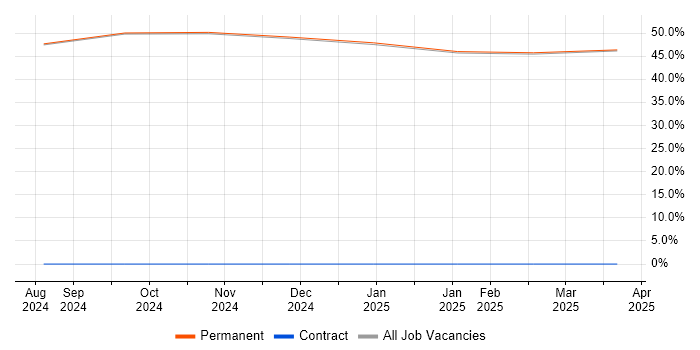Academic Degree
Cumbria > Broughton-in-Furness
The table below provides summary statistics for permanent job vacancies advertised in Broughton-in-Furness with a requirement for Degree qualifications. It includes a benchmarking guide to the salaries offered over the 6 months leading up to 25 June 2025, comparing them to the same period in the previous two years.
| 6 months to 25 Jun 2025 |
Same period 2024 | Same period 2023 | |
|---|---|---|---|
| Rank | 2 | - | - |
| Rank change year-on-year | - | - | - |
| Permanent jobs citing Degree | 101 | 0 | 0 |
| As % of all permanent jobs advertised in Broughton-in-Furness | 56.74% | - | - |
| As % of the Qualifications category | 56.74% | - | - |
| Number of salaries quoted | 30 | 0 | 0 |
| 10th Percentile | £40,000 | - | - |
| 25th Percentile | £45,628 | - | - |
| Median annual salary (50th Percentile) | £51,564 | - | - |
| 75th Percentile | £73,708 | - | - |
| 90th Percentile | - | - | - |
| Cumbria median annual salary | £51,564 | £34,500 | £60,800 |
| % change year-on-year | +49.46% | -43.26% | +64.32% |
All Academic and Professional Certifications
Broughton-in-Furness
Degree falls under the Academic Qualifications and Professional Certifications category. For comparison with the information above, the following table provides summary statistics for all permanent job vacancies requiring academic qualifications or professional certifications in Broughton-in-Furness.
| Permanent vacancies requiring academic qualifications or professional certifications | 178 | 0 | 0 |
| As % of all permanent jobs advertised in Broughton-in-Furness | 100.00% | - | - |
| Number of salaries quoted | 81 | 0 | 0 |
| 10th Percentile | - | - | - |
| 25th Percentile | £7,000 | - | - |
| Median annual salary (50th Percentile) | £45,628 | - | - |
| 75th Percentile | £60,000 | - | - |
| 90th Percentile | £73,708 | - | - |
| Cumbria median annual salary | £45,628 | £38,734 | £60,400 |
| % change year-on-year | +17.80% | -35.87% | +54.87% |
Degree
Job Vacancy Trend in Broughton-in-Furness
Job postings citing Degree as a proportion of all IT jobs advertised in Broughton-in-Furness.

Degree
Salary Trend in Broughton-in-Furness
3-month moving average salary quoted in jobs citing Degree in Broughton-in-Furness.
Degree
Salary Histogram in Broughton-in-Furness
Salary distribution for jobs citing Degree in Broughton-in-Furness over the 6 months to 25 June 2025.
Degree
Co-occurring Skills and Capabilities in Broughton-in-Furness by Category
The follow tables expand on the table above by listing co-occurrences grouped by category. The same employment type, locality and period is covered with up to 20 co-occurrences shown in each of the following categories:
